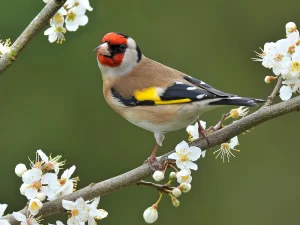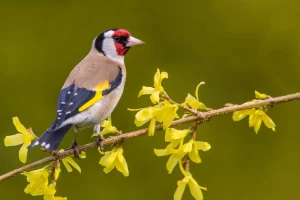European Goldfinches are beautiful, cheerful birds known for their bright feathers and sweet songs. Care for these European Goldfinch creatures requires a good balance of their food, home, health, and social needs.
These cheerful birds can bring happiness to any home, but they need proper care to stay healthy. In this simple guide, I will cover everything you need to know to keep your European Goldfinch happy and growing.
Why European Goldfinches Make Great Pets
European Goldfinches are not only pretty to look at, but they are also friendly, social, and full of energy. Their cheerful chirping and playful nature make them great companions for bird lovers.
However, they need proper care, including the right food, a comfortable home, and social time. If cared for well, they can live for 8-12 years.
Setting Up the Perfect Home For Your European Goldfinch
Choosing the Right Cage For Finches
Your Goldfinch’s cage is its home, so it needs to be comfortable and safe.
- Size: A cage of at least 30 cm x 50 cm is good for one bird, but bigger is better. Goldfinches love to fly, so they need space to move.
- Bar Spacing: The bars should be no more than 1 cm apart so the bird cannot escape and can climb safely.
- Material: Stainless steel or powder-coated cages are best because they last long and are easy to clean.
Tips for Cage Setup
- Perches: Add branches of different sizes (0.5 cm to 1.5 cm) and materials like wood, rope, or natural branches to keep their feet healthy.
- Natural Elements: Use branches or twigs to make the cage feel like their natural home.
- Toys: Provide safe toys like bells and mirrors to keep them entertained.
Location of the Cage For European Goldfinch
- Place the cage in a bright, well-aired space but away from direct sunlight, cold drafts, or extreme heat.
- Keep the room temperature between 18°C and 25°C for their comfort.
Cage Cleaning
- Daily: Wash food and water bowls with warm, soapy water.
- Weekly: Clean the cage and accessories with a bird-safe cleaner.
- Monthly: Deep clean everything, including branches and toys, to stop bacteria from building up.
The Best Diet for European Goldfinches
Care for European Goldfinch is very important. A balanced diet is important to keep your Goldfinch healthy and full of energy.
Seed Mixes (60-70% of Diet)
Feed them a high-quality finch seed mix, with:
- Niger (Nyjer) Seeds: A favorite, full of healthy oils and proteins.
- Sunflower Hearts: Gives energy but should be given in small amounts to prevent weight gain.
Avoid seed mixes with useless fillers like milo, which they often ignore this is important to care for the Goldfinches.
Fresh Fruits and Vegetables (20-30% of Diet)
A good diet is key to your goldfinch’s health and energy. Here’s what to include:
- Greens: Spinach, kale, dandelion leaves, and broccoli.
- Fruits: Apples (remove seeds), bananas, grapes (cut into small pieces), and berries.
Always wash fruits and vegetables well to remove chemicals.
Protein Sources (10% of Diet)
During breeding or when they shed feathers, add more protein:
- Boiled Eggs: Mash a small piece and give it once or twice a week.
- Mealworms or Small Insects: These are like what they eat in nature.
Calcium and Minerals
- Please give them a cuttlebone or mineral block to help keep their bones and beaks strong.
- You can also give crushed eggshells as a natural source of calcium.
Water
- Provide fresh, clean water every day. Change it twice daily to keep it clean.
- Give them a shallow dish for bathing, as Goldfinches love to splash around.
Social Needs and Interaction For European Goldfinch
Companionship
Goldfinches are very social and prefer to be in pairs or small groups. Keeping them alone can make them sad. If keeping them with other birds, choose birds of the same size and friendly nature, like canaries or other finches.
Daily Interaction
- Spend time near your Goldfinch to make them feel comfortable with you.
- They may not like being held but will enjoy gentle talking, whistling, or soft music.
Health and Cleanliness of European Goldfinch
Common Health Problems
European Goldfinches can have certain health problems, including:
- Breathing Issues: This can happen due to dirty cages or bad air. Signs include wheezing or struggling to breathe.
- Parasites: Check for mites or lice, especially near the beak and feet.
- Feather Plucking: This can mean stress, boredom, or a bad diet.
Preventive Care
- Keep the cage clean and give a balanced diet.
- Take your bird for a yearly check-up with a bird doctor.
- Watch for sickness signs like tiredness, weight loss, or strange droppings.
Bathing Routine
- Offer a shallow dish of warm water daily for bathing. This helps keep their feathers clean.
- Always change the water after they bathe to keep it fresh.
Breeding European Goldfinches
Nesting Materials
Provide soft and safe nesting materials like:
- Wool
- Tissue paper
- Long grasses
Put these in a small nest cup or basket inside the cage.
Diet During Breeding
- Give extra protein with boiled eggs and small insects.
- Provide more fresh fruits and vegetables to help both parents and chicks stay strong.
Fun Activities for Your Goldfinch
Keeping your European Goldfinch entertained is important for their happiness and health. Some fun activity ideas include:
-
- Natural Branches: Encourage climbing and exploring.
- Toys: Use safe toys like bells and swings.
- Outdoor Time: If safe, place the cage outside for fresh air and sunlight (always supervised).
Final Words
Taking Care of a European Goldfinch is a wonderful experience that needs attention to their specific needs. They need the right food, a spacious and clean cage, daily social time, and fun activities to stay happy. Following this guide will ensure your Goldfinch lives a long, healthy, and joyful life.
